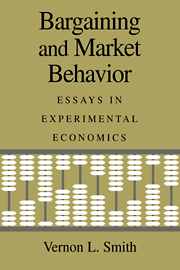Book contents
- Frontmatter
- Contents
- Preface
- Part I Economics and Psychology
- Part II Bargaining Theory, Behavior, and Evolutionary Psychology
- Part III Institutions and Markets
- INTRODUCTION
- 10 Reflections on Some Experimental Market Mechanisms for Classical Environments
- 11 Experimental Methods in the Political Economy of Exchange
- 12 Individual Rationality, Market Rationality, and Value Estimation
- 13 Market Contestability in the Presence of Sunk (Entry) Costs
- 14 The Boundaries of Competitive Price Theory: Convergence, Expectations, and Transaction Costs
- 15 Off-Floor Trading, Disintegration, and the Bid–Ask Spread in Experimental Market
- 16 Bertrand-Edgeworth Competition in Experimental Markets
- 17 An Experimental Examination of the Walrasian Tâtonnement Mechanism
- Part IV Stock Markets and Bubbles in the Laboratory
- References
- Index
12 - Individual Rationality, Market Rationality, and Value Estimation
Published online by Cambridge University Press: 29 October 2009
- Frontmatter
- Contents
- Preface
- Part I Economics and Psychology
- Part II Bargaining Theory, Behavior, and Evolutionary Psychology
- Part III Institutions and Markets
- INTRODUCTION
- 10 Reflections on Some Experimental Market Mechanisms for Classical Environments
- 11 Experimental Methods in the Political Economy of Exchange
- 12 Individual Rationality, Market Rationality, and Value Estimation
- 13 Market Contestability in the Presence of Sunk (Entry) Costs
- 14 The Boundaries of Competitive Price Theory: Convergence, Expectations, and Transaction Costs
- 15 Off-Floor Trading, Disintegration, and the Bid–Ask Spread in Experimental Market
- 16 Bertrand-Edgeworth Competition in Experimental Markets
- 17 An Experimental Examination of the Walrasian Tâtonnement Mechanism
- Part IV Stock Markets and Bubbles in the Laboratory
- References
- Index
Summary
Direct experimental tests of expected utility theory (EUT), in which subjects are asked to choose among alternative gambles or to make judgments as to their willingness-to-pay (WTP) and/or willingness-to-accept (WTA) payment for a gamble, have not been kind to EUT. As noted in the survey by Slovic and Lichtenstein (1983), the results of these interrogations are remarkably consistent in a wide variety of contexts and are robust under examinations designed to determine the effect of monetary incentives, experience, and other factors that might have accounted for the discrepancy between subject responses and the predictions of EUT. On the other hand, experimental studies of individual and market behavior based upon EUT models of market decision making have yielded results showing high consistency with the predictions of these models (see the references in Smith, 1982). Are individual revealed preferences in some market contexts more likely to be “rational” (consistent with EUT) than individual responses to choices among alternative prospects?
Several studies designed to solicit WTP and WTA responses for a variety of goods have found a wide disparity between the “buying price” and “selling price” measures of individual value (see the study and the citations therein by Knetsch and Sinden, 1984; hereafter K-S).Values of WTA obtained in this way are frequently an order of magnitude greater than values of WTP although theoretically WTP and WTA “should” differ by no more than a presumed “small” income effect. These results should not be dismissed by economists on the grounds of poor subject motivation because the experiments include some (see those in K-S) that have carefully introduced actual monetary payments and cash compensations and have not relied on hypothetical choices.
- Type
- Chapter
- Information
- Bargaining and Market BehaviorEssays in Experimental Economics, pp. 257 - 264Publisher: Cambridge University PressPrint publication year: 2000
- 10
- Cited by



